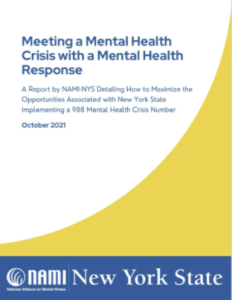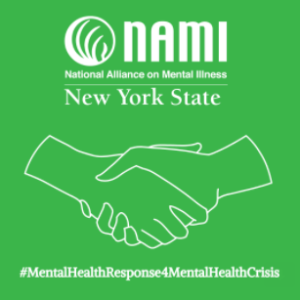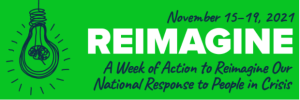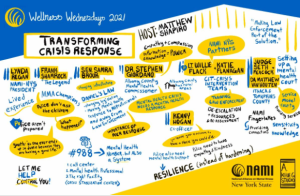Mental Health Update

MH Update -11/3/2021 – NAMI-NYS Action Alert: NAMI-NYS Releases Mental Health Crisis Response Report
Our colleagues at NAMI-NYS just put out a comprehensive report on the crisis service system in New York State. The voice of the families is essential in any crisis response as we have often been the intermediaries
between law enforcement and the hospitals.
We look forward to reviewing and continuing to work with NAMI-NYS and other advocacy groups in responding to crisis services in New York.
Share on Social Media and with Local Officials
Register for Reimagine: A Week of Action to Reimagine Our National Response to People in Crisis
 NAMI-NYS is working to address the traumatic and oftentimes tragic outcomes that occur when law enforcement has to intervene with people living with a mental illness when they are experiencing a crisis situation, with the release of our sweeping report; Meeting a Mental Health Crisis with a Mental Health Response-A Report by NAMI-NYS Detailing How to Maximize the Opportunities Associated with New York State Implementing a 988 Mental Health Crisis Number.
NAMI-NYS is working to address the traumatic and oftentimes tragic outcomes that occur when law enforcement has to intervene with people living with a mental illness when they are experiencing a crisis situation, with the release of our sweeping report; Meeting a Mental Health Crisis with a Mental Health Response-A Report by NAMI-NYS Detailing How to Maximize the Opportunities Associated with New York State Implementing a 988 Mental Health Crisis Number.
Since 2015, nearly one in four fatal police shootings nationally have been of people with mental illness and of those, one in three were people of color. Unfortunately, New York has not been immune to this heartbreaking and avoidable trend, as the death of Daniel Prude in 2020 at the hands of the Rochester police is just the latest in a line of New Yorkers who lived with mental illness and lost their lives by the hands of police. These tragedies are even more frequent when it comes to police response to people of color in a mental health crisis. Other prominent recent examples of New Yorkers from communities of color living with a mental illness who died by police responding to their crisis include Deborah Danner and Saheed
Vassell. The 2020 pepper spraying incident of a nine-year old girl experiencing a mental health crisis in Rochester also speaks for the need for the reforms NAMI-NYS is recommending in the report
These preventable tragedies are inequitable and unacceptable. It is time for New York to commit to ensuring a mental health crisis is met with a mental health response. The landmark report provides a roadmap on how to build upon the implementation of a 988 mental health crisis number in July 2022, in order to create a fully functioning mental health crisis response system.
“New York State has a tremendous opportunity to better address a mental health crisis with the implementation of the 988 Mental Health Crisis number that does not simply replace 911 but improves on it,” says* NAMI-NYS executive director, Wendy Burch adding, “However, we only have one chance to implement a mental health crisis response system correctly, which is why we cannot squander this opportunity and only address one piece of the solution. NAMI-NYS’s report provides all the steps necessary to properly address a mental health crisis and thus creating a more mentally healthy New York State.”
“The New York State Office of Mental Health has made great strides in this area and has demonstrated a commitment towards appropriately responding to mental health crisis situations”” says *NAMI NYS president, Mary Bartlett, adding “but the stories of our members contained in the report demonstrate that New York’s families are still being traumatized by negative interactions with law enforcement. The report provides NAMI-NYS recommendations on how to build on existing New York State initiatives and create a fully functioning statewide mental health crisis response system, which puts people on the road to recovery and frees up law enforcement to do the job they signed up to do.”
The report details how, along with a 988 number to call during a crisis, having specially trained mental health professionals respond to these calls and having recovery oriented crisis stabilization services to take someone who needs to be removed from the crisis location are both integral elements needed for an appropriate mental health crisis response. The report also details the funding available to establish and sustain the three crucial elements of a mental health crisis response.
Key Recommendations from the Report:
TAKE ACTION!!!
Share the Report on Social Media and With Your Local Officials
 The timing of the report is crucial as New York is now deciding what elements will be used to pair with the implementation of the 988 mental health crisis number in July and how these initiatives will be funded.
The timing of the report is crucial as New York is now deciding what elements will be used to pair with the implementation of the 988 mental health crisis number in July and how these initiatives will be funded.
Your voices are needed to promote the report in your local communities and
to your local officials.
Click here for a resource document which contains:
1-An Email Message to Local Officials to Provide Them the Report
2-Social Media Messages
3-Main Mental Health Crisis Response Reform Talking Points
4-Graphics to Use for Social Media
Register Today !!!
NAMI-NYS’s crisis response report also highlights harrowing stories from our members demonstrating how the lack of a mental health crisis response system is negatively impacting individuals and families experiencing mental Illness. On *Thursday, November 18th, NAMI-NYS’s associate director, public affairs, Matthew Shapiro will be presenting on the importance of using stories as an advocacy tool at the NAMI sponsored REIMAGINE: A Week of Action to Reimagine Our National Response to People in Crisis,
taking place November 15-19*. *We highly encourage NAMI-NYS advocates to participate in *Reimagine*, you can click here to learn more and register for the free event.
Watch NAMI-NYS Unveil the Report and Present the 2021 Criminal Justice Award at the
2021 NAMI-NYS Education Conference
NAMI-NYS unveiled the report last week at our education conference.
Click here to watch the session where NAMI-NYS President Mary Bartlett*and Associate Director, Public Affairs Matthew Shapiro detail the report’s findings. The session also includes the presentation of the 2021 NAMI-NYS Criminal Justice Award to Deputy Chief of Police Jay Gerace, Colonie Police Department.
The session also features a discussion of the successful collaborative initiatives conducted in Albany County with Deputy Chief Gerace, Colonie Police Chief Michael Woods, Albany County Mental Health Commissioner Stephen Giordano and Albany County Mental Health Clinical Director of Emergency/Crisis Services and Training Katie Flanagan as well as a testimonial from NAMI-NYS vice-president Martin Gromulat.
Watch NAMI-NYS’s Wellness Wednesday on Transforming Crisis Response
In May, NAMI-NYS hosted a Hannaford Wellness Wednesday on Transforming Crisis Response The session assembled an all-star panel to explore all the necessary components for mental health crisis response. Panelists included: NYS Senate Mental Health Chair Samra Brouk, NAMI Ambassador Frank “the Legend” Shamrock, Lt. Willie Flack, Albany Police Department, Katie Flanagan Clinical Director of Emergency/Crisis Services and Training Albany County Department of Mental Hygiene, Stephen J. Giordano, Ph.D. Albany County Director of Community Services (DCS) and Albany County Mental Health Commissioner, The Hon. Judge Scott Miller, The Hon. Judge Seth Peacock, Tompkins County District Attorney, Matthew Van Houten and Kenny Hogan, Chief Resilience Officer” for the Union County, NJ Prosecutor’s Office.
Watch NAMI-NYS Discuss the Need for Mental Health Crisis Response on the News
As stated earlier, transforming crisis response is a leading priority for NAMI-NYS and we have been active discussing these issues in the media.
Click here to watch a report from NTD News where NAMI-NYS discusses the need for mobile crisis services in the NYC Subway system.
Click here to watch a WCBS, New York City report on incidents in the NYC transit system where NAMI-NYS discusses the impact of budget withholds and bed reductions on people with mental health issues and the need for diversion services.
Click here to watch a report from WCBS in New York where NAMI-NYS explains the need to improve services for those coming out of jails and prisons with mental health challenges.
#Act4MentalHealth
#ReimagineCrisis
#MentalHealthResponse4MentalHealthCrisis



